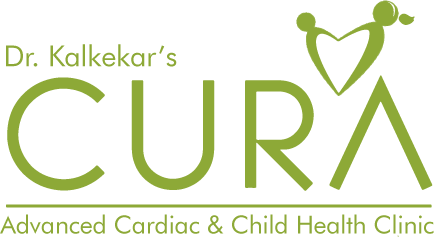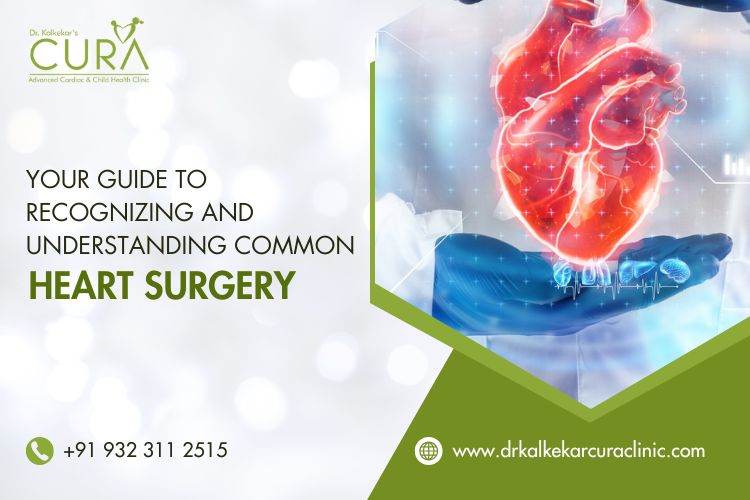Your Guide to Recognizing and Understanding Common Heart Conditions
Heart disease is a significant worldwide health concern, impacting millions of lives each year. Despite progress in medical care, its prevalence continues to grow, making it essential to recognize its signs, causes, and ways to prevent it. This guide by Dr. Kalkekar’s Cura Clinic, a heart specialist in Seawoods, aims to provide clear and actionable insights into understanding and managing common heart conditions.
What is Heart Disease?
Heart disease, also known as cardiovascular disease, is a group of conditions affecting the heart and blood vessels. Here’s a closer look at some prevalent heart conditions:
Coronary Artery Disease (CAD):
What it is: Narrowing of coronary arteries due to plaque buildup.
Symptoms: Chest pain, shortness of breath, fatigue.
Heart Failure:
What it is: Reduced efficiency in pumping blood.
Symptoms: Leg swelling, shortness of breath, persistent coughing.
Atrial Fibrillation (AFib):
What it is: Irregular heartbeat that increases stroke risk.
Symptoms: Palpitations, dizziness, weakness.
Heart Valve Disease:
What it is: Dysfunctional heart valves affecting blood flow.
Symptoms: Fatigue, irregular heartbeat, chest discomfort.
Without timely management, these conditions can cause severe issues, but early detection can make a significant difference.
Recognizing Symptoms of Heart Disease
Understanding the warning signs can save lives. Keep an eye out for the following:
- Chest Pain or Discomfort: A classic sign of coronary artery disease, it may feel like pressure, tightness, or squeezing in the chest.
- Shortness of Breath: Can happen with or without chest pain, often linked to heart failure or a heart attack.
- Pain in Unusual Areas: Discomfort in the neck, jaw, throat, or back can signal heart issues, especially in women.
- Fatigue: Persistent tiredness after regular activities might indicate an underlying problem.
- Swelling in Legs, Ankles, or Feet: A sign of fluid retention due to heart failure.
- Irregular Heartbeat: Palpitations or skipped beats may point to arrhythmias requiring medical attention.
Causes and Risk Factors
Heart disease often stems from a mixture of lifestyle preferences and genetic factors. Major contributors include:
- High Blood Pressure: Damages arteries and fosters plaque buildup.
- High Cholesterol: LDL cholesterol forms plaques, raising the risk of heart attacks.
- Smoking: Harms blood vessels and lowers oxygen levels in the blood.
- Diabetes: Increases the risk of heart damage.
- Obesity: Linked to high blood pressure, diabetes, and cholesterol issues.
- Sedentary Lifestyle: No workout or no exercise can lead to weight gain and other risk factors.
- Unhealthy Diet: Diets rich in saturated fats, sugar, and sodium are detrimental to heart health.
- Family History: Genetics plays a role, especially if close relatives have had heart conditions.
- Age and Gender: Men are at higher risk earlier in life, while women’s risk rises after menopause.
Prevention: Steps to Protect Your Heart
Taking charge of your heart health is empowering. Here are some practical steps to reduce your risk:
- Eat Heart-Healthy Foods: Opt for fruits, vegetables, whole grains, and lean proteins while limiting processed foods.
- Stay Active: Aim for at least 150 minutes of moderate exercise per week, that is 30 minutes a day.
- Quit Smoking: Avoid smoking and regularly monitor your blood pressure, cholesterol, and sugar levels.
- Maintain a Healthy Weight: Achieve a balanced weight through diet and activity.
- Manage Stress: Practice relaxation approaches like yoga, meditation, or nature walks.
- Get Regular Check-ups: Regular visits to your healthcare specialist can help detect and manage risks early.
Take Charge of Your Heart Health
Cardiovascular issues pose significant challenges, yet they can be overcome. By identifying the symptoms, being aware of the dangers, and implementing preventive strategies, you can protect your heart for the long term. Consistent health screenings, along with a balanced lifestyle, are your best partners in keeping a robust and durable heart.
If you are looking for a heart specialist in Seawoods, look no further than Dr. Kalkekar’s Cura Clinic. Stay proactive, stay informed, and encourage your loved ones to prioritize heart health too!




